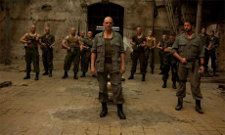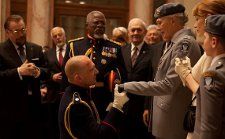
Fiennes has brought anti-hero Coriolanus to the screen for the first time.
Meeting Ralph Fiennes in an Edinburgh hotel before he heads to a screening of Coriolanus, it's initially hard to believe that this eloquent, rather softly spoken, slimly built and fine featured gent has carved a niche for himself as a cinematic 'baddie'. He's put fear into a generation of kids as the nasally challenged Voldemort, epitomised the worst of Nazi Germany in Schindler's List, brings a sculpted fierceness to the title role of this adaptation that is more than a match for co-star Gerard Butler's physicality and he'll soon be co-starring in Skyfall, where he is rumoured to be taking the role of Bond's arch-enemy Blofeld. Yet, sitting with him as he explains the ins and outs of the project, it's tough to imagine him conjuring menace.
But something happens two-thirds of the way through our chat to make me reassess my assumptions. As we discuss the mother and son relationship that provides the backbone for the Greek tragedy aspect of the Shakespeare play - "It all leads to the mother and son," he insists. "Not even partially - essentially." - Fiennes suddenly quotes a segment while looking me directly in the eye. It's a powerful - and, frankly, unsettling - moment and, and as I try to maintain his gaze while noticing that a small muscle in my left cheek has begun to tic nervously, I realise why directors cast him for his intensity.
He certainly uses this sort of muscular acting in the lead role of Coriolanus, a war hero who comes to discover that military motivations and political posturing rarely make good bedfellows. It's a raw and exposed performance, and Fiennes also brings bravery and heft to the directing - transporting the action with the help of John Logan's adapted screenplay into a modern warzone, stripping back the Shakespeare but retaining its cadence and strength.
So how did Fiennes come to find such virtue in economy?
"A lot of this is to do with John Logan, who did the screenplay," says Fiennes. "I pitched him the idea of a contemporary Coriolanus, keeping Shakespeare's text but necessarily having to cut it right back, believing that underneath this knotty, very dense play, you've got this dynamic, take-no-prisoners narrative about political dysfunction, leading to an essential mother/son confrontation, which is the tragic nerve centre of it.
"We had to cut but, of course, on film, one line out of a 10-line speech - if you choose the right line - will land. Like Brian Cox's line, "There's no more mercy in him than milk in a male tiger" - boof! - that actually is one line taken from a much longer speech. That was thrilling because you release something. Because you've got to be careful where you put the weight of words in a dialogue-heavy film."
Some critics have said the film feels as though it's set in the Balkans, but the internecine fighting could be happening virtually anywhere in a world which, currently, has no shortage of conflict hotspots.
"A lot of thought went into it," says Fiennes. "I wanted it to be modern - but what was that modern going to be? Belgrade was the city I chose - partly for financial reasons, but also because it has a sort of bruised, traumatised quality to it. I actually fell in love with it because it had all these locations that I realised we could afford and give the film a scale.
"As I was realising the practical reality of that being achievable, I thought, of course, it's got all the Yugoslav, Serb, Bosnian other stuff. Some people think or have written that it's a Balkan version... but it's not. It's a place.
"Over the few years you can track outbursts and demonstrations. Athens has been having demonstrations for a while, and Burma. And there are ongoing, tentative crises of demonstration in Russia. And, even when I was doing it, there were little demonstrations in America that were being put down very aggressively."
So with protests and warzones evident right across the globe from the Arab Spring to the Occupy Wall St movement, does he feel as though it's a play for our times?

"I think it always is," he says. "When I started thinking about it, it seemed to have a lot to say about what was going on to do with conflict. There seems to be two essential things - there's a people frustrated because economically they have no support. So when I see people going on the street, whether it's in Belarussia or in the Ukraine, it's for exactly the same reasons that people go on the street in this. They say in Shakespeare it's because they have no bread, but it's the same thing. But also, there's this continual conflict that we can't stop."
Coriolanus himself is a very conflicted character, struggling to do one thing and yet pushed into making decisions that will lead to his downfall by his mother. All the while, the audience is unsure whether to root for this man who is clearly a hero but has no common touch with the populace or whether to side with the renegade Tullus Aufidius (Gerard Butler).
"I love that Shakespeare doesn't let us know who's the bad guy or who's the good guy," he says. "The tragic protagonist is flawed. Often, it's pride, arrogance or a kind of blindness or there is something - Othello is blind, for example. I think at the end you're left with a sense of desolation. I think tragedy should silence its audience. I think you're silenced by the pity of it.
"Shakespeare is brilliant on power because he knows there is an essential need for strong leadership, but once the person abuses the power through contempt or capriciousness or sheer weakness, they can't function. He always knows there's a conundrum about leadership. Brutus in Julius Caesar is a fascinating study as a man of conscience murdering in order to make something right and then being unable to function politically and being naive politically in letting Mark Anthony speak. And I think Shakespeare's really clever in the spin doctoring of a moment."
So, at 49 and with two decades of work behind him, Fiennes has finally stepped behind the camera. But how difficult is it to be the conductor of proceedings at the same time as the principal player?
"It's really tough," admits Fiennes. "You've got to have great people around you. I spent a long time preparing this, thinking, thinking, thinking and going to these locations and walking them again and again and storyboarding, so I tried to have a really strong idea of what this was so that I could be decisive and clear to actors and crew on the day. It didn't stop it being hard but I think I pretty much knew what I wanted to do in each scene.
"The actual bit of the camera's on me, I'm going to do it, that's not such a challenge, because as an actor you're trained to go and then you find the nuances and shifts. The editorialising of your own performance is the hardest thing. It's not so much the act of acting while you're directing, what's hardest is to go, 'How do I know that I've got the take? I've done five takes and they've all got interesting things - which is the one?' That's when it's really hard because you've got to make a judgement call in that moment. And if you make a choice to go on for another take, you're taking time, so also there's a weird guilt factor about taking too much time for your own performance when you should be giving time and space to the other actor."
Tricky or not, Fiennes has no intentions of simply retreating back into acting. He says he is certainly up for taking the director's chair again, although he wants the holy grail of all filmmakers - "more time". And he's been encouraged by audience reactions to the film since it premiered at London Film Festival last year.
"I think the anxiety that it might go terribly wrong was always lurking", he says. "And I think, on balance, that this seems to hold its own and the response has mostly been, if not positive, then interested, so that's given me, I suppose, sort of confidence that I would go in again a little calmer inside. There is something that I have been asked to do but it's not modern. But I would like to do something modern."





















